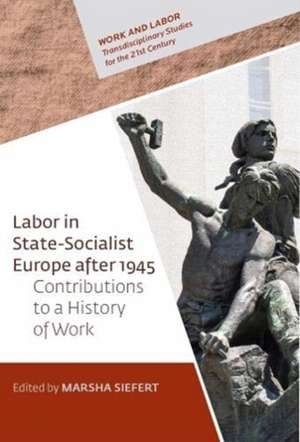Labor in State-Socialist Europe, 1945-1989: Work and Labor - Transdisciplinary Studies for the 21st Century
en Limba Engleză Hardback – 14 iul 2020
Labor regimes under communism in East-Central Europe were complex, shifting, and ambiguous. This collection of sixteen essays offers new conceptual and empirical ways to understand their history from the end of World War II to 1989, and to think about how their experiences relate to debates about labor history, both European and global.
The authors reconsider the history of state socialism by re-examining the policies and problems of communist regimes and recovering the voices of the workers who built them. The contributors look at work and workers in Albania, Bulgaria, Czechoslovakia, the German Democratic Republic, Hungary, Poland, Romania, and Yugoslavia. They explore the often contentious relationship between politics and labor policy, dealing with diverse topics including workers' safety and risks; labor rights and protests; working women's politics and professions; migrant workers and social welfare; attempts to control workers' behavior and stem unemployment; and cases of incomplete, compromised, or even abandoned processes of proletarianization. Workers are presented as active agents in resisting and supporting changes in labor policies, in choosing allegiances, and in defining the very nature of work.
Preț: 1045.45 lei
Preț vechi: 1357.73 lei
-23% Nou
200.05€ • 208.46$ • 165.64£
Carte tipărită la comandă
Livrare economică 03-17 aprilie
Specificații
ISBN-10: 9633863376
Pagini: 450
Dimensiuni: 236 x 163 x 31 mm
Greutate: 0.82 kg
Editura: CEU EDUCATIONAL SERVICE NON-PROFIT LLC
Seria Work and Labor - Transdisciplinary Studies for the 21st Century
Notă biografică
Marsha Siefert is Associate Professor of History at Central European University.

